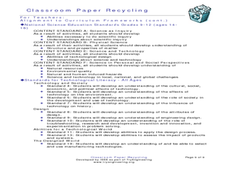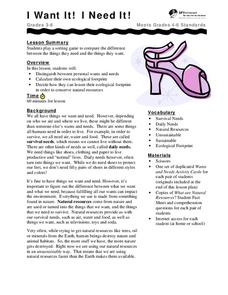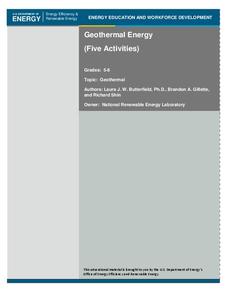National Museum of the American Indian
Lone Dog's Winter Count: Keeping History Alive
What is oral tradition, and what unique tool did the Native Americans of the Northern Great Plains use to help them remember their complex histories? Through pictograph analysis, discussion, research, and an engaging hands-on activity,...
Institute of Electrical and Electronics Engineers
Rotational Equilibrium
Physics stars design mobiles that demonstrate rotational equilibrium. They take measurements and solve related equations for force by graphing, substitution, or determinants. This is a well-developed lesson plan, complete with student...
Curated OER
The Poetics of Hip Hop
The Bard, Nikki Giovanni, Mos Def? “Sonnet 18,” Ego Tripping,” and “Black on Both Sides”? Sure! It’s the poetics. Class members compare the lyrics, rhythm, and rhyme in classic poetry to hip-hop in a richly detailed resource that...
Carnegie Mellon University
International Perspectives to Climate Change 2
A couple PowerPoint presentations are used to stimulate discussion about the perspectives of different countries on the issue of energy consumption. Afterward, they play a game in which each team is assigned a country, considers its...
Carnegie Mellon University
International Perspectives to Climate Change 1
After a lecture about how the first industrial revolution triggered the path to climate change, your environmental studies class discusses what the impacts are. In a culminating activity, they get into groups and identify countries on a...
Curated OER
The Effect of Natural Selection on Genes, Traits and Individuals
Rotating through five stations, evolutionary biologists explore the question of how changes in DNA facilitate the changes in a population over time. High-quality, colorful cards of animals, skeletons, skulls, and DNA sequences can all be...
Consortium for Ocean Science Exploration and Engagement (COSEE)
Plankton to Penguins: Antarctic Food Web
A well-written lesson plan, second in a series of four, gets high schoolers exploring how the Antarctic food web is impacted by climate change and the associated melting of polar ice sheets. It begins with a PowerPoint presentation about...
Field Museum
The Case of Darwin's Finches
One of the most striking pieces of evidence for Darwin's Evolution of Species was his observations of finches and how their beaks differed from island to island, depending on their primary food sources. So what would happen to the theory...
Howard Hughes Medical Institute
How Novel Icefish Genes Can Improve Human Health
Designed to accompany the 13-minute video The Making of the Fittest: The Birth and Death of Genes, this handout serves as both a viewing guide during the video and an analysis of how the adaptations of the icefish might help treat some...
Institute of Electrical and Electronics Engineers
Classroom Paper Recycling
After reading about the history and recycling of paper, creative crafters collaborate to think of a new process for making recycled paper. A complete teacher's guide and student worksheets are included. There is no written procedure for...
Howard Hughes Medical Institute
Got Lactase? The Co-Evolution of Genes and Culture
Does the human body evolve as quickly as human culture? With a stellar 15-minute video, explore the trait of lactose intolerance. Only about 1/3 of human adults seem to still have the enzyme lactase and therefore, the ability to digest...
Howard Hughes Medical Institute
The Making of the Fittest: The Birth and Death of Genes
Adaptations must be made as environments change. This fabulous presentation features Icelandic icefish, a transparent, scaleless specimen that even has colorless blood. Genetics and adaptations concepts are explored as scientists study...
National Math + Science Initative
Using Linear Equations to Define Geometric Solids
Making the transition from two-dimensional shapes to three-dimensional solids can be difficult for many geometry high schoolers. This comprehensive Common Core lesson plan starts with writing and graphing linear equations to define a...
Curated OER
Whirligig Lollapalooza
Using a cut-out template of a whirligig, emerging engineers experiment with flight behavior. After you teach them the concepts of force, air resistance, and lift, they discuss what variables on the whirligigs might be changed in order to...
City and County of San Francisco
I Want It! I Need It!
Discuss wants and needs with your elementary ecologists and get them to consider what would happen to our natural resources if we all got everything that we want. Learners play a card sorting game and take an ecological footprint quiz on...
Curated OER
Daily Lesson Plan for a Struggling Reader
Strategy-based programs that are executed with consistency are the best for achieving growth in any learner with a learning disability. Here is a seven-step lesson plan that is highly structured and is intended to help learners with...
NASA
Erosion and Landslides
A professional-quality PowerPoint, which includes links to footage of actual landslides in action, opens this moving lesson. Viewers learn what conditions lead to erosion and land giving way. They simulate landslides with a variety of...
NASA
Earth's Global Energy Budget
Introduce your earth science enthusiasts to the earth's energy budget. Teach them using an informative set of slides that include illuminating lecturer's notes, relevant vocabulary, embedded animations, colorful satellite maps, and a...
NASA
Rain Gauge Activity
Complete teacher narrative and presentation slides for teaching about Earth's water make up the bulk of this lesson. Embedded within the slide show, you will find videos about the water cycle, keeping track of the limited supply of fresh...
Institute of Electrical and Electronics Engineers
Nano Waterproofing
This instructional activity will make an impact, especially on scientist-athletes who may have an interest in waterproof clothing! Acting as materials engineers, they work collaboratively on waterproofing pieces of cotton fabric. This...
Institute of Electrical and Electronics Engineers
Telescoping Periscope
Ahoy, matey! Here is an engineering expedition that mini mariners are sure to be swept away by! After reading a brief description and history of periscopes, they work in crews to construct one. Use this activity to enhance a lesson on...
National Geographic
Rivers and the Gabcikovo-Nagymaros Project
Damming rivers has been a case of necessity versus negative environmental impact since the process began. Kids take on the role of a stakeholder in the proposed damming of the Danube River. They begin by reading arguments for and against...
US Department of Energy
Geothermal Energy
With Earth Day quickly approaching, as well as many science fairs, why not challenge your class to investigate geothermal energy or other renewable energy resources? There are five driving questions explored in depth here, as well as...
Baylor College
How Can We Find Out What Is in Water?
Using paper chromatography, water watchers discover that several substances might be dissolved even though they aren't visible. For this case, you will prepare a mixture of three different food colorings for them to experiment with. A...
























